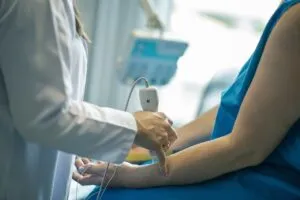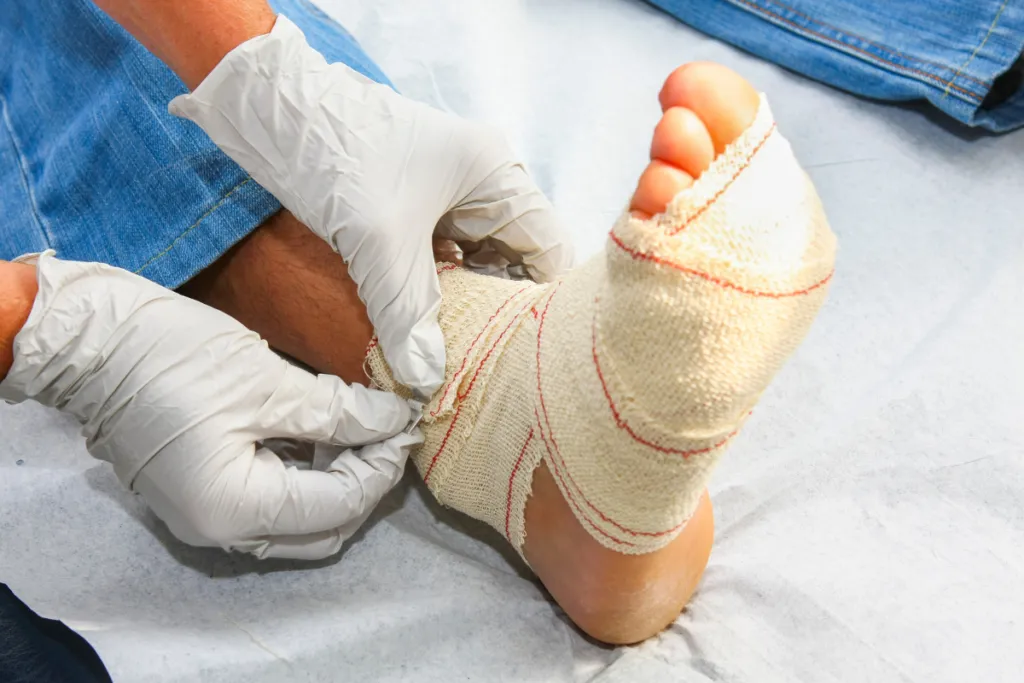Why Multidisciplinary Wound Care is Key to Recovery
Advanced wound care is pivotal in expediting recovery and enhancing the quality of healing. By employing specialized techniques and technologies, this approach addresses complex wounds that standard treatments might not effectively heal.
Key Components of Advanced Wound Care:
- Negative Pressure Wound Therapy (NPWT): This technique uses controlled suction to remove excess fluids and promote blood flow to the wound area, facilitating faster healing.
- Hyperbaric Oxygen Therapy (HBOT): By delivering pure oxygen in a pressurized environment, HBOT enhances the body’s natural healing processes and combats infections more effectively.
- Biologic Dressings & Skin Substitutes: These are engineered materials that mimic natural skin, providing a protective barrier and promoting tissue regeneration.
- Compression Therapy: Essential for vascular wounds, this therapy improves circulation and reduces swelling, creating an optimal environment for healing.
- Debridement Procedures: The removal of dead or infected tissue is crucial to prevent the spread of infection and to promote the growth of healthy tissue.
Integrating these advanced treatments within a multidisciplinary team ensures that each aspect of wound care is addressed, leading to more efficient and effective recovery.
The Impact of Nutrition on Wound Healing
Nutrition plays a critical role in the body’s ability to heal wounds. A well-balanced diet provides the necessary building blocks for tissue repair and immune function.
Nutritional Factors Influencing Healing:
- Protein: Essential for tissue repair and the production of enzymes involved in healing.
- Vitamins C and A: Vital for collagen formation and immune function.
- Zinc: Plays a role in DNA synthesis and cell proliferation, crucial for wound repair.
- Hydration: Adequate fluid intake ensures optimal skin turgor and nutrient transport to wound sites.
A multidisciplinary team often includes nutritionists who can tailor dietary plans to support the healing process, addressing specific deficiencies and promoting overall health.
Patient Involvement in the Healing Process
Active patient participation is a cornerstone of successful wound healing. When patients are educated and engaged in their care, outcomes improve significantly.
Ways Patients Can Engage in Their Healing:
- Adherence to Treatment Plans: Following medical advice regarding wound care routines and medication schedules.
- Lifestyle Modifications: Incorporating healthy eating, regular physical activity, and smoking cessation to promote healing.
- Monitoring for Complications: Being vigilant about signs of infection or other issues and reporting them promptly to healthcare providers.
- Attending Follow-Up Appointments: Regular check-ins allow for the timely adjustment of treatment plans and early detection of potential problems.
Educational resources and support systems provided by the healthcare team empower patients, making them active participants in their recovery journey.
For more insights into advanced wound care techniques, you can refer to this comprehensive guide.
To understand the role of nutrition in wound healing, this resource offers valuable information.
For guidance on patient involvement in the healing process, this article provides practical advice.
Why Multidisciplinary Wound Care is Key to Recovery
Effective wound healing requires more than just a single treatment approach. A multidisciplinary team brings together specialists from various fields, ensuring that each aspect of wound care is addressed. From advanced treatments to personalized nutrition plans, this comprehensive method enhances healing, reduces complications, and improves patient outcomes.
How Does a Multidisciplinary Wound Care Team Improve Wound Healing?

A multidisciplinary wound care team integrates expertise from various medical professionals, such as:
- Wound Care Specialists: Perform advanced debridement and apply state-of-the-art treatments.
- Vascular Surgeons: Address blood flow issues, which are critical for wound healing.
- Infectious Disease Experts: Manage wound infections to prevent complications.
- Nutritionists: Recommend diets rich in protein, vitamins, and minerals that promote tissue repair.
- Physical Therapists: Enhance mobility, which prevents pressure injuries and improves circulation.
This collaborative approach ensures that all underlying conditions are managed, leading to faster recovery and fewer setbacks.
Learn more about our Advanced Wound Care Services.
Who Benefits Most from Multidisciplinary Wound Care?
Patients with chronic, slow-healing, or complex wounds benefit the most from this approach, including:
- Individuals with Diabetes: At risk for diabetic foot ulcers and slow healing.
- Patients with Pressure Injuries: Those who are bedridden or have limited mobility.
- People with Vascular Conditions: Poor circulation can delay healing, requiring specialized care.
- Post-Surgical Patients: Wound care teams help prevent infections and promote faster recovery.
If you or a loved one falls into these categories, seeking multidisciplinary wound care can significantly improve healing outcomes.
Explore our Diabetic Foot Ulcer Treatment for specialized care.
What Advanced Treatments Are Used in Multidisciplinary Wound Care?
A team-based approach allows access to cutting-edge treatments, including:
- Negative Pressure Wound Therapy (NPWT): A vacuum-assisted closure system that accelerates healing.
- Hyperbaric Oxygen Therapy (HBOT): Increases oxygen levels in tissues to promote recovery.
- Biologic Dressings & Skin Substitutes: Promote cell regeneration and prevent infections.
- Compression Therapy: Used for vascular wounds to improve circulation.
- Debridement Procedures: Removes dead tissue to stimulate healthy healing.
These advanced techniques are part of a comprehensive wound care strategy that ensures long-term healing success.
What Role Does Nutrition Play in Wound Healing?
Proper nutrition is a critical but often overlooked factor in the wound healing process. A multidisciplinary wound care team includes nutritionists who ensure patients receive:
- High-Protein Diets: Essential for tissue repair and immune function.
- Vitamin C & Zinc: Key nutrients for collagen production and wound healing.
- Adequate Hydration: Keeps skin elastic and promotes cell function.
- Balanced Blood Sugar Levels: Critical for diabetics to avoid wound complications.
Patients working with a nutritionist experience faster healing and fewer infections, proving that food is truly medicine.
How Can Patients Actively Participate in Their Wound Healing Journey?
Healing is a partnership between medical teams and patients. To maximize recovery, patients should:
- Follow Medical Instructions: Adhere to dressing changes, prescribed medications, and follow-up visits.
- Maintain Good Hygiene: Keep wounds clean and dry to prevent infections.
- Manage Underlying Conditions: Control diabetes, hypertension, or vascular diseases to support healing.
- Adopt a Healthy Lifestyle: Proper diet, hydration, and quitting smoking improve outcomes.
- Communicate Openly: Report any changes, pain, or concerns to the care team immediately.
By taking an active role in their care, patients experience improved healing and a greater sense of control over their recovery.
Healing complex wounds requires a multifaceted approach. By combining expertise from wound care specialists, vascular surgeons, infectious disease experts, nutritionists, and physical therapists, multidisciplinary wound care provides patients with the best chance at a full recovery. With access to advanced treatments, personalized nutrition plans, and the support of a dedicated team, patients can heal faster, prevent complications, and regain their quality of life. Taking an active role in the process further enhances outcomes, making collaboration between medical professionals and patients the key to effective wound management.
Key Takeaways
- A Multidisciplinary Approach Speeds Up Healing
A coordinated team of specialists ensures every aspect of wound care is covered—from infection management to circulation improvement. This approach leads to faster healing and better long-term outcomes. - Specialized Treatments Enhance Recovery
Advanced therapies like Negative Pressure Wound Therapy (NPWT) and Hyperbaric Oxygen Therapy (HBOT) significantly improve wound healing. These cutting-edge solutions help prevent complications and accelerate recovery. Learn more about the role of Negative Pressure Wound Therapy in wound healing. - Nutrition is Essential for Wound Healing
A well-balanced diet rich in protein, vitamins, and minerals strengthens the body’s ability to repair tissue. Managing blood sugar levels and staying hydrated also play a critical role in wound healing. - Chronic Wounds Require Specialized Care
Patients with diabetes, vascular diseases, or pressure injuries need specialized treatment to prevent infections and promote proper healing. Multidisciplinary wound care provides tailored solutions for these high-risk individuals. - Patient Involvement is Key to Recovery
Following medical advice, maintaining good hygiene, and managing underlying health conditions contribute to better wound healing. Partnering with a wound care team ensures optimal recovery and prevents future complications. Get expert guidance on wound care management.
Related Questions About Multidisciplinary Wound Care
1. How Does a Multidisciplinary Wound Care Team Improve Wound Healing?
A multidisciplinary wound care team improves healing by integrating expertise from various medical professionals, such as:
- Wound Care Specialists: Perform advanced debridement and apply state-of-the-art treatments.
- Vascular Surgeons: Address blood flow issues, which are critical for wound healing.
- Infectious Disease Experts: Manage wound infections to prevent complications.
- Nutritionists: Recommend diets rich in protein, vitamins, and minerals that promote tissue repair.
- Physical Therapists: Enhance mobility, which prevents pressure injuries and improves circulation.
This collaborative approach ensures that all underlying conditions are managed, leading to faster recovery and fewer setbacks.
(Learn more about our Advanced Wound Care Services.)
2. Who Benefits Most from Multidisciplinary Wound Care?
Patients who experience chronic, slow-healing, or complex wounds benefit the most from this approach, including:
- Individuals with Diabetes: At risk for diabetic foot ulcers and slow healing.
- Patients with Pressure Injuries: Those who are bedridden or have limited mobility.
- People with Vascular Conditions: Poor circulation can delay healing, requiring specialized care.
- Post-Surgical Patients: Wound care teams help prevent infections and promote faster recovery.
If you or a loved one fits into these categories, seeking multidisciplinary wound care can significantly improve healing outcomes.
3. What Advanced Treatments are Used in Multidisciplinary Wound Care?
A team-based approach allows access to cutting-edge treatments, including:
- Negative Pressure Wound Therapy (NPWT): A vacuum-assisted closure system that accelerates healing.
- Hyperbaric Oxygen Therapy (HBOT): Increases oxygen levels in tissues to promote recovery.
- Biologic Dressings & Skin Substitutes: Promote cell regeneration and prevent infections.
- Compression Therapy: Used for vascular wounds to improve circulation.
- Debridement Procedures: Removes dead tissue to stimulate healthy healing.
These advanced techniques are part of a comprehensive wound care strategy that ensures long-term healing success.
4. What Role Does Nutrition Play in Wound Healing?
Proper nutrition is a critical but often overlooked factor in the wound healing process. A multidisciplinary wound care team includes nutritionists who ensure patients receive:
- High-Protein Diets: Essential for tissue repair and immune function.
- Vitamin C & Zinc: Key nutrients for collagen production and wound healing.
- Adequate Hydration: Keeps skin elastic and promotes cell function.
- Balanced Blood Sugar Levels: Critical for diabetics to avoid wound complications.
Patients working with a nutritionist experience faster healing and fewer infections, proving that food is truly medicine.
5. How Can Patients Actively Participate in Their Wound Healing Journey?
Healing is a partnership between medical teams and patients. To maximize recovery, patients should:
- Follow Medical Instructions: Adhere to dressing changes, prescribed medications, and follow-up visits.
- Maintain Good Hygiene: Keep wounds clean and dry to prevent infections.
- Manage Underlying Conditions: Control diabetes, hypertension, or vascular diseases to support healing.
- Adopt a Healthy Lifestyle: Proper diet, hydration, and quitting smoking improve outcomes.
- Communicate Openly: Report any changes, pain, or concerns to the care team immediately.
By taking an active role in their care, patients experience improved healing and a greater sense of control over their recovery.




